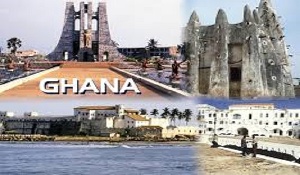The Ghana Tourism Authority was established by the Tourism Act, 2011 (Act 817). It replaced the Ghana Tourist Board which was established by NRCD 224 in 1973 as amended by SMCD 80 of 1977.
The Ghana Tourism Authority is the Public Service agency in charge of regulating tourism in Ghana through marketing and promoting, licensing and classification of tourism facilities and services, research and other tourism developmental projects.
The mission of the Ghana Tourism Authority is to ensure sustainable tourism development through the creation of enabling environment for the provision of quality tourism facilities and services - like the National Theatre, Kwame Nkrumah Memorial Park, W.E.B Du Bois Centre, Ghana Museums and Monuments Board as well as many others for the travelling public with a well-qualified, highly motivated and dedicated workforce.
As the main implementing agency of the Ministry of Tourism, Arts and Culture, its functions includes the regulation of tourism enterprises namely accommodation, catering, travel and tour, charter operations, through registering, inspecting licensing and classification. Also the promotion of tourism in Ghana and abroad, including the publication of tourism publicity and promotional materials, participation in fairs and exhibition.
Ghana as an African country has a long stable democracy and healthy economy that makes it a safe place and an all-weather travel destination for all and sundry. From our rich Ghanaian cuisines and languages, to our culture and beautiful tourist sites/attractions is definitely inevitable to yearn for an expedition.
Some key priorities to augment tourism’s role in preserving and promoting Ghana’s culture includes the need for championing cultural tourism, for instance by closely integrating cultural tourism policies and planning.
Again, safeguarding tangible cultural heritage by closely monitoring the capacity of cultural sites and destinations and also engaging local communities and hence revitalise the creative arts, historic buildings and even entire neighbourhoods- for example, promoting promising avenues like food or culinary tourism.
With the above said, tourism therefore contributes significantly to our economic growth worldwide. As a sector, it is the third largest contributor to global Gross Domestic Product (GDP) of tourism arrivals at an exponential rate indicating that tourism offers jobs for a range of individuals from low skilled to highly skilled workers.
In Ghana, the tourism sector can boast of numerous industries within the value chain including accommodation, medical centres, agriculture, aviation, entertainment and public transport.
Tourism is more than, being a mere part of the global economy thus specifically seem as a means of furthering inclusive growth that is about increasing opportunities from all, based on the principles of equity and leaving nothing behind. As a people -centred activity, tourism plays a role in spearheading inclusiveness particularly for under-represented groups - including women, the youth and those with special needs.
The myriad between tourism and culture contributes to inclusive, sustainable development that presents notable opportunities for safeguarding Ghana's cultural heritage including initiatives to restore traditions across various regions. To sum it up, an effective governance policy and tool is the bedrock for sustainable development.
As a collaborative effort, the tourism industry is the face of the nation and has a great future as it helps produce results when partnerships are formed between international organizations, government department forums, civil societies, local communities to mention a few. This therefore supports that Tourism is therefore a bedrock for national development.
Opinions of Sunday, 6 October 2019
Columnist: Dosu Edith Elorm
Tourism, a bedrock for national development
Entertainment














